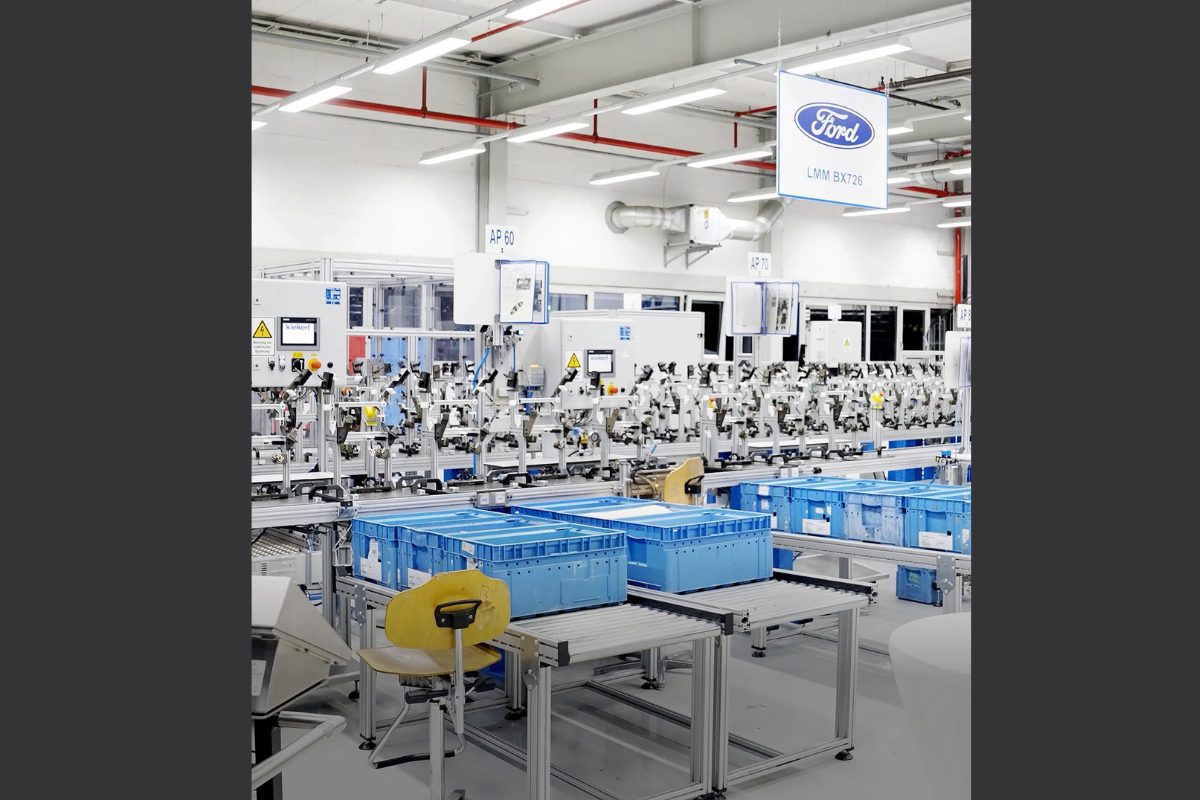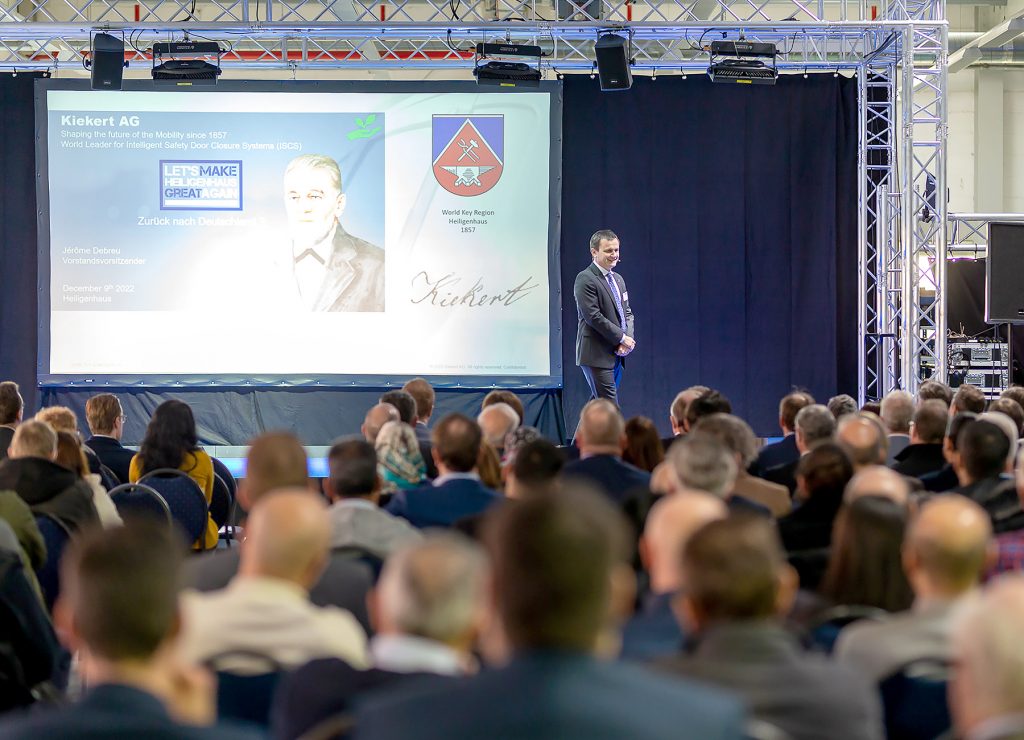Bringing the Future Home: Kiekert
The world’s leading producer of automotive locking systems is boosting local production at its Heiligenhaus headquarters, a move that shows new CEO Jérôme Debreu’s belief in the passion and strength of its workforce.
Kiekert, the German technology pioneer in automotive access and intelligent safety closure systems, has announced that it is boosting production at its Heiligenhaus site following the appointment of Jérôme Debreu as both CEO and CFO.

The popular move will lead to 150 additional local jobs and was celebrated during an event at the plant on 9 December, an occasion that was also attended by Volker Kiekert, the great-grandson of the company founder, Arnold Kiekert.
It was the first visit of a family member to the site since 1971 and reflected Debreu’s pledge to reconnect the group to its roots after some operations had been shifted to Eastern Europe and rumors were swirling that its German base was under threat.
For Debreu, this was a statement of his commitment to ensuring the company’s future is in the area it has called home since the mid-19th century.

"Trying to run a German company without a headquarters in Germany is strategically unsound and not feasible in the long run," Debreu tells The CEO Magazine. "We need to maintain and grow the center of competence in Heiligenhaus and therefore we also need production close at hand for future product and process development.
"My job in terms of corporate social responsibility was to take care of the people who made Kiekert – that’s what I have done."
A powerful statement
The first major customer to be affected by the move is Ford, who have wholeheartedly backed the plan. For Debreu, it sends out a powerful statement about his company’s values and ambitions.
"Heiligenhaus is the strategic hub of our company," he says proudly. "This is where our global success story began. Our German headquarters and plant here are firmly linked to our corporate identity and will continue to play an important role in supplying our European customers and strategically developing our product portfolio in the future."
Trying to run a German company without a headquarters in Germany is strategically unsound.
As the global leader in automotive access systems, Kiekert supplies over 100 vehicle manufacturers. It has developed and manufactured well over two billion locking systems and achieved an extraordinary worldwide market share of 21 per cent. Including its joint ventures, it employs around 5,300 people at 10 locations in 10 countries, including eight R&D centers. One in three new cars contains Kiekert technology.
"We’ve been in the area for more than 160 years, have more than 700 people working in Germany and wish to continue employment for the families who depend on us," Debreu says proudly.
"This is where the real world matters – you need to have a beer with the people, you need to have dinner with the people. You need to meet them again and again," he stresses. "Digital is of course useful, but real contact and presence is what matters long-term."
A strategic decision
The ‘re-localizing’ of production has been a part of Debreu’s plans since he took over as CEO in 2021. While other major component and OEM manufacturers were building factories in Asia and eastern European countries, Jérôme recognized the simmering global tensions and made the counterintuitive – and strategically important – decision to do the exact opposite.
"Many companies have been moving production from Germany to foreign countries. The fact that we decided to grow the facility in Germany is purely strategic and will hugely benefit us in the long term. We were not swayed by what others were thinking!
"How can you be a German world leader and yet your way of making a profit is to save costs by closing your own headquarters? It’s like taking a gun and shooting it at your head, then wondering if you will still be alive. There cannot be any survival for Kiekert if we don’t stay in Germany."
To futureproof Kiekert, we need to develop local people and products where the customers are.
The company plans to grow production turnover in Germany to about €80 Million (US$83 million) annually. Meanwhile, output at its facility in the Czech Republic will also be increased as more product lines are launched.
"Kiekert’s strength lies in its many years of experience combined with its know-how in areas such as development, manufacturing, engineering, purchasing, controlling, quality and production, all of which will be under one roof.
"An engineer cannot properly engineer without production, and production cannot work efficiently without an engineer – it’s a closed cycle."
Here to Stay
The disruption and uncertainty of the past three years has made Debreu’s plan even more crucial for Kiekert’s continued expansion.
"The industry is very aware that globalization has hurt us very much since 2019 and the focus on more regional or local supply chains means more stability in the future," he says. "A secondary driver was to confirm to external stakeholders, insurance companies, credit facilities and banks that we are here to stay in Germany."
Futureproofing
Training and upskilling German staff will create what he describes as ‘anticipation skills’, something that is difficult when interactions are remote.
"You don’t get anticipation skills when you only talk to people online. You get it when you talk to people onsite. To futureproof Kiekert, we need to develop local people and products where the customers are – it’s a re-localization.
They need to have a future and I think that’s the biggest mistake in management today, that people don’t learn how to build their successors.
"It makes no sense to manufacture Japanese products in Germany and then export them. You have to manufacture close to Japan for the Japanese market. You manufacture in China for China. It makes no sense at all to manufacture in China and then export to Europe."
Debreu’s passion and belief in Kiekert’s home country are both palpable.
"It would be insane if I didn’t prepare my succession for the Kiekert employees of tomorrow," he declares. "They need to have a future and I think that’s the biggest mistake in management today, that people don’t learn how to build their successors."